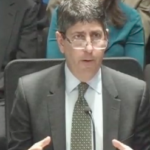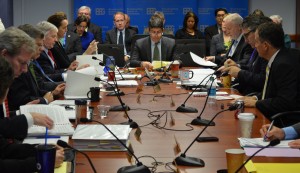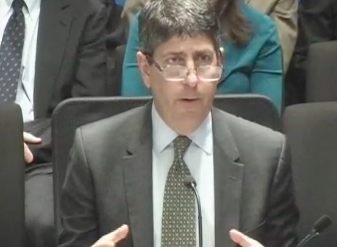BBG Watch Commentary

At today’s open meeting of the Broadcasting Board of Governors (BBG) its chairman Jeff Shell announced a new interim management team at BBG’s chief management and support unit, the International Broadcasting Bureau (IBB), while the board tries to hire a permanent agency CEO. Jeff Trimble, who is acting IBB director, will be out of his current job in early January. He will be replaced by a three-person team, as announced by Jeff Shell who cited unanimous approval of the board for this move.
Shell said that Jeff Trimble will stay with the BBG and will take a yet undetermined journalistic job.
Shell also announced that these personnel changes are temporary as the entire board is “extremely committed to hiring not only a CEO, but a great CEO for this organization.” “We think it’s critical. This is a part-time board and we need a full-time CEO to manage the organization. This interim structure is an interim structure,” Shell said.
Trimble will be replaced by André Mendes, Director of IBB Office of Technology, Services and Innovation; Suzie Carroll, BBG’s Executive Director; and Robert Bole, Director of Innovation. Their respective interim titles would be Director of Global Operations (Mendes), Director of Global Strategy (Bole), and Director of Global Communications (Carroll), BBG Governor Armstrong announced. Shell announced that Armstrong would have an advisory liaison role with the interim IBB management team.
Shell said that André Mendes will focus on agency management issues, Robert Bole in addition to his normal duties will focus on strategic issues and oversee the work of the Office of Strategy and Development headed by Bruce Sherman and the Office of Performance Review. Suzie Carroll will expand her oversight of external and internal communications, Shell also announced.
Shell said that oversight congressional committees will be notified about these interim management structure changes.
Shell also said that Jeff Trimble “is important to the organization.” Shell added:
“…for fifteen years, Jeff Trimble who is here at the table with us, has served this agency with distinction and success — and no, he’s not leaving, so before this sounds like [laughter in the room] he might want to; we’re not letting him. He’s been an editorial executive; he’s been a manager; he’s been a senior official. And Jeff and I have talked both in here and at his home for several hours about each step of the way he has gotten further and further away from his love, which is really journalism and the news. So, as opposed to having him as part of this management team here, I think what we’ve all agreed here as a board is to try to find Jeff something where we can use his incredible talents and experience in the organization to help us with the various challenges we have and at the same time get him closer to his love of journalism and … editorial … and the board … will discuss various potential roles for Jeff and I think we will announce something in the coming weeks. But I didn’t want to be any ambiguity about Jeff’s role. We very much value Jeff — the tremendous work you’ve done, you know, over the last fifteen years. I think we’re trying to find exactly the right place and I know you’ve been involved in these discussions.” — BBG Chairman Jeff Shell
Some longtime observers of U.S. international broadcasting see these announcements as a highly positive change and an indication that the new BBG board is working together and working well on reforming the agency. Under Shell’s leadership, the board seems to have started to assert much more its oversight role and its duty to provide strategic direction, but also to send a signal to employees that it is still serious about improving governance and morale throughout the agency.
After the retirement in November of former IBB Director Richard Lobo, the latest personnel changes seem to represent a major attempt by Shell and the new board to address longstanding, highly dysfunctional and employee-unfriendly culture within top ranks of IBB executives, as well as within the Voice of America (VOA), although no personnel changes at VOA were announced during today’s meeting.
VOA Director David Ensor gave a presentation of VOA operations, which was viewed by board members, guests and streamed online. Ensor gave a smooth presentation but did not offer a single strategic vision for his organization or focus on the ailing news operation and news reporting as a core activity of VOA. He talked at length about news digital technological solutions to program delivery, affiliations with local stations, and music and English teaching programs. He spoke relatively little about VOA’s unique role among U.S. international media outlets and its desired program content and impact, causing BBG governors to ask questions related to these topics.
Jeff Shell asked Ensor to describe how VOA is different from BBG’s surrogate media outlets. He did not receive a clear answer.
Well-placed sources tell BBG Watch that Shell and board members are highly concerned about the definition of VOA’s mission, management issues, including some of its managers whom they see as responsible for poor employee morale, and inferior quality of VOA news reporting and website management.
Some of these concerns were reflected in a question from BBG Governor Matt Armstrong to VOA Director David Ensor after Ensor’s presentation about VOA. Armstrong noted that in his review of VOA English and some of the foreign language websites he discovered serious deficiencies in news coverage and asked how VOA managers plan to address this problem.
“Every time there is a breaking news event — I’m not talking about a car chase or a white Bronco on a freeway — I go to VOA websites, not just English, but the other websites, those that I can sort of ascertain, realize … I’ve actually studied three other languages … not that I can speak any of them, and I also use Google translate to try to help me, and then I get the pictures and look at the general layout, and what I find surprising is what appears to be the lack on the website of any event and that we lag significantly behind other media outlets whether they would be our direct tier-one competitors, whether it it is CCTV, Russia Today, CNNI, BBC, whatever it’s going to be. And then when we do file a story, it seems it’s thin at the least, especially when I compare it to these other offerings. And so when I want to pick on the VOA English website — and you make a comment that English is number one audience with 35 million — it seems to me that with English being a major audience for you and lingua franca around the world and if we want to build VOA as a premier news and information provider around the world that there should be a greater integration and timeliness and completeness of news and information on the web, not just in English.” — BBG Governor Matt Armstrong
Ensor’s response to Governor Armstrong was that “this is a resource question.” He would not admit, as many critics point out, that this is also, if not primarily, a question of bad management. Critics point to Ensor’s retention of controversial managers, some with anger management issues, who have alienated the workforce. According to critics, they have been responsible already for many years for putting in place an unworkable and failing news reporting structure and for contributing to poor employee morale, just as IBB executives who will soon be replaced by a new team have been responsible for overall management problems of the entire agency.
Executive Director of the Committee for U.S. International Broadcasting, Ann Noonan, who spoke as a member of the public shortly before Ensor’s presentation, also raised concerns about VOA’s management and recent news coverage failures that resulted in late, superficial and sometimes erroneous reporting on U.S. foreign policy and statements on Ukraine from Vice President Biden and Senator McCain. She called for urgent personnel and management reforms not only at VOA but also at IBB. Some of them have been announced at today’s BBG meeting.
Noonan also praised the original reporting work of the VOA Ukrainian Service, as well as Radio Free Europe / Radio Liberty (RFE/RL) reporting from Ukraine. She also applauded RFE/RL CEO Kevin Klose for his management reforms while urging further reforms of RFE/RL personnel policies to improve treatment of foreign-born journalists from many countries working for the surrogate media outlet.
BBG Governor Ryan Crocker made a point that VOA executives might think about specializing more in reporting on U.S. political news and views, which is one of the requirements of the VOA Charter. He and Governor Kenneth Weinstein also asked questions about VOA Persian Service as did Assistant Secretary of State for Public Affairs Douglas Frantz, who was designated by Secretary of State John Kerry – a BBG board member – to represent him at today’s meeting.
Governor McCue asked David Ensor about management issues that affect employees morale.
In asking questions about VOA’s role in U.S. international media outreach, BBG Governors who spoke seemed more concerned about mission and impact than with raw audience statistics.
Jeff Shell asked David Ensor where he would employ any additional resources if they became available. Ensor said that he would focus on U.S. national security issues and countries of strategic interest for the United States. Ensor did not mention the need to improve news coverage and management. He did, however, mention in response to a question from Governor Armstrong plans to fill six positions on the VOA web desk.
After David Ensor’s presentation, Jeff Shell introduced Netflix CEO Reed Hastings as the keynote speaker for a panel discussion on the transition of international media organizations in the digital age.
Overall, it was probably the best and the most promising BBG meeting in recent history.
BBG PRESS RELEASE
Board Paves Way For Ongoing Restructuring And Innovation
DECEMBER 18, 2013

The Broadcasting Board of Governors today announced an interim management structure, took an in-depth look at the Voice of America and hosted a rich discussion on technology and innovation with key industry leaders.
The Board agreed to divide the responsibilities of the recently retired IBB Director among three members of the senior management team in order to help pave the way for a future Chief Executive Officer. Under this interim structure, André Mendes will serve as Director of Global Operations, Robert Bole will be Director of Global Strategy, and Suzie Carroll will serve as Director of Global Communications. Together they will lead the agency in an arrangement that is expected to begin in January, pending congressional approval.
“These individuals were chosen because they are forward thinkers and change agents,” said Chair Jeff Shell. “We are extremely committed to bringing on board a CEO, and this interim management structure will prepare the organization for that reform.”
Mendes, Bole, and Carroll will provide, in their respective areas, oversight and direction to the Director of the Voice of America, the Director of the Office of Cuba Broadcasting, and all other offices of the federal agency. The three will work together until a CEO is selected and hired. Governor Matt Armstrong will serve as the Board’s Management Liaison.
Jeff Trimble, IBB Deputy Director, will transition to a new role to be announced separately. Shell thanked Trimble for taking the helm of the IBB management team after IBB Director Dick Lobo’s retirement.
After the regular business meeting, including comments from the public, the Board held a 90-minute “deep dive” session focused on the Voice of America. Before a live studio audience, VOA Director David Ensor reviewed the network’s worldwide activities, distribution and effectiveness, illustrating his talk with numerous examples of excellent work by VOA journalists. Ensor also fielded questions from the Board concerning mission, allocation of resources, and audience engagement.
The technology and innovation panel opened with a discussion between Shell and Reed Hastings, CEO of Netflix, about the challenges of steering a large international media organization. Hastings was then joined by Macon Phillips, Coordinator of the State Department’s Bureau of International Information Programs, and Tom Cochran, Chief Technology Officer of Atlantic Media, in a panel moderated by Bole. An engaging conversation followed between the panelists, governors, and assembled audience on topics including measuring impact, developing partnerships and revitalizing content strategies.
All three segments of the Board meeting were live streamed online and are available for viewing here.
